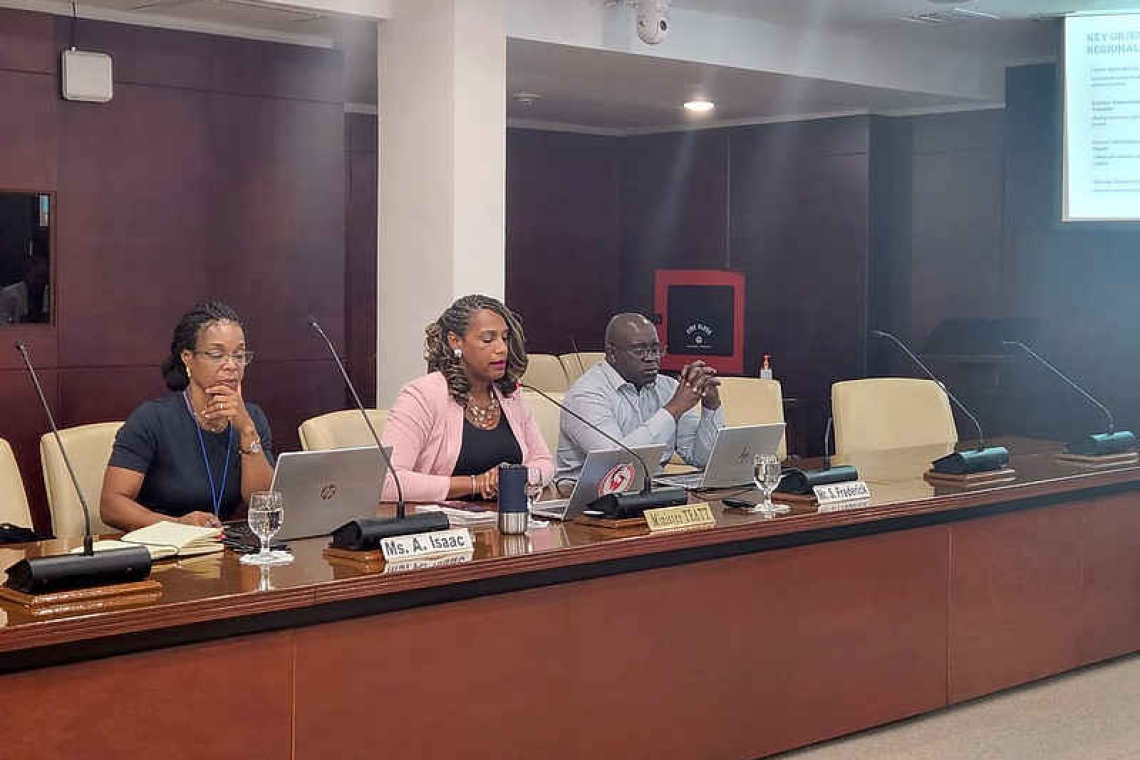TEATT Minister Grisha Heyliger-Marten (centre) addressing MPs during Monday’s meeting with members of her delegation.
PHILIPSBURG--Minister of Tourism, Economic Affairs, Transport and Telecommunication (TEATT) Grisha Heyliger-Marten has announced a package of measures aimed at protecting St. Maarten’s food security and economic stability in light of global tariff tensions.
The announcement was made during a meeting of Parliament’s Permanent Committee of Agriculture, Fisheries and Animal Husbandry (CAFAH) on Monday.
At the centre of the measures is the launch of an Agriculture, Livestock and Fisheries Agency (ALF) to support farmers, promote local production, and coordinate regional food security efforts through the Dutch Caribbean Agriculture, Livestock and Fisheries Agency (DC-ALFA). The ALF Agency will develop and oversee a comprehensive certification process that guarantees quality and safety. This certification will serve as a mark of trust for consumers, elevating the reputation of local produce and giving it the competitive edge it deserves in both domestic and regional markets, the minister said.
Other measures include diversifying import sources through new trade relationships with countries such as St. Kitts, Panama, Barbados, St. Martin, and the Dominican Republic; upgrading port infrastructure as part of a regional transshipment hub vision; forming a cross-ministerial National Trade and Resilience Task Force; strengthening consumer protections; and expanding St. Maarten’s trade portfolio through existing ties with Europe, Latin America, and the Caribbean.
The National Trade and Resilience Task Force will be a cross-ministerial task force that will monitor global trade shifts, coordinate regional responses, and strengthen national resilience strategies particularly in food and trade sectors.
“These efforts, some already underway and others being expanded, are crucial steps in reducing St. Maarten’s exposure to global shocks and creating a more self-reliant future,” said Heyliger-Marten.
The Minister said although the ongoing tariff war may seem distant from St. Maarten’s shores, the ripple effects could hit St. Maarten hard due to its reliance on imports and limited local production. Among the most pressing concerns is the potential for increased food prices. “Tariffs raise the cost of imported food from key trading partners, with higher prices passed on to consumers,” she said, adding that this would particularly affect “families, especially low-income households,” by increasing grocery bills and reducing access to nutritious food.
Heyliger-Marten also highlighted the risk of supply chain disruptions, pointing to possible export restrictions, shipping delays, or supply rerouting. “Retailers and restaurants risk stock shortages; hospitals may face delays in receiving essential supplies.”
The country’s economic vulnerability is further exposed by its heavy reliance on imports. “A narrow economic base and heavy import dependence make the island sensitive to global price shocks,” she stated. “Economic fragility increases; more public funds may be needed to support food security and protect vulnerable groups.”
Additionally, she warned that “tariffs and compliance burdens raise the cost of goods before arrival, affecting supply chains,” which would ultimately result in higher consumer prices and decreased business competitiveness.
“We did not anticipate a global tariff war playing a direct role in today's conversation, but its potential impact on our food system is undeniable,” Heyliger-Marten said. “More than ever, this reinforces the urgency of reducing our dependency on imports.”
She said government must now “accelerate efforts to invest in local agriculture, fisheries, and water security, and fast-track the establishment of an Agriculture, Livestock and Fisheries Agency. These steps, she stressed, “are no longer just strategic — they are essential for building a resilient and food-secure future for St. Maarten.”
While measures to reduce import dependency were already underway, the Minister said, “the resurgence of global tariff tensions especially involving key partners like the United States, “has pushed us to broaden our scope and deepen our commitment.” She stressed that “these evolving international dynamics underscore the need to move swiftly and strategically to protect St. Maarten’s food security and economic resilience.”
She said also that as part of efforts to reduce high food import costs and strengthen food security, the Ministry of TEATT has been actively engaging with regional partners to build strategic trade relationships focused on agriculture, livestock, and fisheries.
“We have already conducted productive bilateral meetings with St. Kitts, Panama, and Barbados, and we plan to expand these efforts by visiting the Dominican Republic and Colombia in the coming months,” Heyliger-Marten said. “These engagements are not casual — they are strategic, and St. Maarten approaches each meeting with a clear set of goals and priorities, especially given that we are starting from a low base of agricultural knowledge and infrastructure,” she noted.
The Minister outlined the objectives of these regional trade visits, including identifying available agricultural products and export capacities, negotiating stable trade terms, exploring opportunities for knowledge and technology transfer, establishing partnerships in supply chain logistics, sourcing affordable agricultural inputs, and aligning biosecurity and food safety standards.







